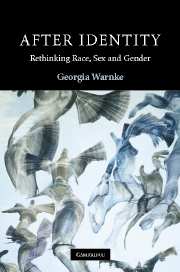Book contents
- Frontmatter
- Contents
- Acknowledgments
- Table of cases
- Introduction: reading individuals
- 1 The tragedy of David Reimer
- 2 Racial identification and identity
- 3 Race and interpretation
- 4 Sex and science
- 5 Rethinking sex and gender identities
- 6 Marriage, the military, and identity
- 7 Hermeneutics and the politics of identity
- Conclusion
- Index
3 - Race and interpretation
Published online by Cambridge University Press: 22 September 2009
- Frontmatter
- Contents
- Acknowledgments
- Table of cases
- Introduction: reading individuals
- 1 The tragedy of David Reimer
- 2 Racial identification and identity
- 3 Race and interpretation
- 4 Sex and science
- 5 Rethinking sex and gender identities
- 6 Marriage, the military, and identity
- 7 Hermeneutics and the politics of identity
- Conclusion
- Index
Summary
Some of our identities are clearly only occasional and, moreover, recreational since they are defined by occasional and recreational activities. We are BBC lovers and baseball fans, for example, because and to the extent that we watch the BBC and baseball games. These identities are “constructed” to the extent that they depend on events, activities, and amusements specific to the histories and societies of which we are a part. We could not be baseball fans unless there were a game of baseball and we could not be BBC lovers in the USA before the advent of cable television. The identities also have looping effects, as we saw in chapter 2. They are not only made possible by the availability of these activities and amusements in the society of which we are a part but also loop back to develop the activities and amusements that make them possible. Someone invents the game of baseball, for example, and people begin to enjoy playing and watching it. Professional teams appear and individuals become fans of specific ones. This team identification feeds back into the public institution of baseball and changes the place and status it has in the society of which it is a part. In turn, the public institution of baseball changes and restructures what it means to be a baseball fan.
- Type
- Chapter
- Information
- After IdentityRethinking Race, Sex, and Gender, pp. 82 - 119Publisher: Cambridge University PressPrint publication year: 2008

